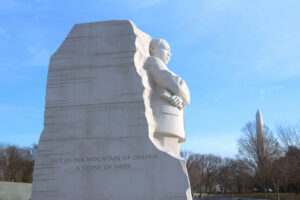
April 4 marked the fiftieth anniversary of the assassination of Dr. Martin Luther King, Jr. Cities around the nation commemorated the event with marches and speakers honoring Dr. King’s memory. Though events took place in hundreds of cities, here btw takes a look at some of the most significant ones.
Remembering a Life

Credit: NPS Photo
One of the largest gatherings took place in Memphis, Tennessee: the town where Dr. King was shot on the balcony of the Lorraine Motel on April 4, 1968. The motel itself is now a part of the National Civil Rights Museum. Memphis police estimated that roughly 10,000 people turned out last week to remember the fallen leader. People linked arms and sang songs such as “We Shall Overcome.” At the end of the march, Dr. King’s son, Martin Luther King III, spoke to the crowd about the evils of racism and widespread poverty in today’s society.
Another significant ceremony happened in Atlanta, Georgia: Dr. King’s hometown. His daughter, the Rev. Bernice King, spoke about the impact her father’s life had had on herself and on others. Wreaths were laid on his grave and church bells across the city chimed 39 times to commemorate the moment of his death. (King was 39 years old when he was killed.)
And in Montgomery, Alabama, where Dr. King first gained widespread attention for leading the now-famous bus boycott, the daughter of segregationist Governor George Wallace gave a speech paying tribute to King.
Remembrance at the Nation’s Capital
In Washington, D.C., thousands attended a rally and silent prayer walk beneath his thirty-foot-tall memorial. And President Trump issued a proclamation in Dr. King’s honor.
A Lasting Message
Though many people traveled long distances to attend one of the historic marches and ceremonies, a common message from the participants was that merely remembering Dr. King isn’t enough. Instead, we should all make an effort to continue his work. This is especially true now when racism and nationalism are creating deep divides within our country. Many of the marchers and speakers urged people to remember Dr. King’s messages about the evils of racism and poverty, and to honor King’s memory by making personal sacrifices–as King did–to fight against these challenges in the hopes of creating a better, more just society for the future.
